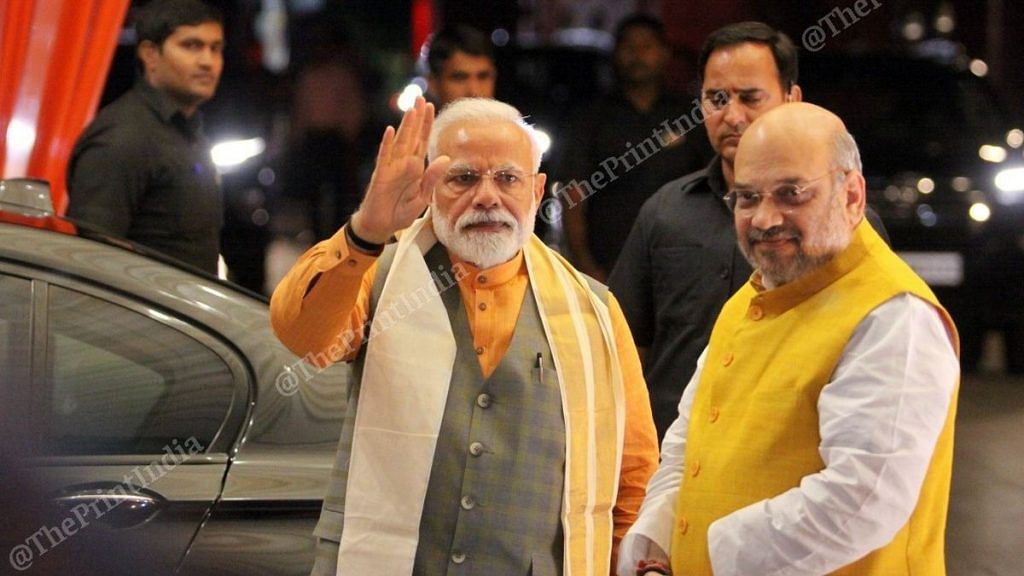New Delhi: The Narendra Modi government is moving swiftly to implement the Supreme Court’s 9 November Ayodhya judgment, which awarded the disputed site to the Hindus and said a trust should be set up by the central government to run it.
The initial suggestion is to keep politicians out of the proposed trust, sources told ThePrint.
The government has also already asked experts if a law is required to be passed by Parliament to implement the judgment in totality.
The unanimous judgment of the Constitution bench, headed by Chief Justice of India Ranjan Gogoi, asked the central government to set up the trust within three months in accordance with the powers vested in it under Sections 6 and 7 of the Acquisition of Certain Area at Ayodhya Act, 1993. This trust, the Supreme Court said, will be handed over the lands in the inner courtyard and the outer courtyards, including the 2.77 acres that was the subject of the Ayodhya dispute.
According to sources, the home ministry is working closely with the law ministry to check if an amendment is needed in the 1993 legislation or if a new stand-alone law is required to be passed in Parliament to enable the setting up of the trust and provide it the necessary powers.
The government also wants to know the other tasks it has to perform to facilitate the construction of the Ram Temple at the earliest.
Initial feedback suggests that the existing provisions of the 1993 Act are enough to facilitate the setting up of a trust.
Sources said the home ministry had, some time back, also drafted a bill to facilitate the construction of the Ram Temple, but it was put on hold pending the Supreme Court’s adjudication on the dispute.
Also read: Throne for ‘Ram Lalla’, 424 pillars & a gaushala — What VHP’s temple in Ayodhya looks like
No politicians in trust
Sources involved in preliminary discussions within the government said the initial plan is to keep politicians out of the trust. While the Supreme Court has ordered that appropriate representation shall be given to the Nirmohi Akhara, one of the litigants in the case, there is overwhelming consensus that the trust should have men and women of impeccable credentials.
“Discussions are at very preliminary stages. But, we feel no politician should be represented in the trust,” said a senior government functionary involved in the process.
“Also, since the trust is also going to be possibly involved in the management of the affairs of the temple once it is constructed and thrown open to devotees, the trustees must be men and women of impeccable credentials, who are not seen as partisan to any particular political party. But, all this is at a very preliminary stage,” the officer said.
The officer cited the example of the Shri Mata Vaishno Devi Shrine Board, which has been overseeing the management of the holy shrine at Katra, J&K, since 1986, to indicate the present thought process.
“The Shrine Board is completely apolitical but not without its share of religious personalities. Currently, Sri Sri Ravi Shankar of the Art of Living Foundation is a nominated member. But, none of the members are directly associated with any political party. That, we think, is how the trust to manage the Ram Temple should also look like,” the officer said.
Also read: Can Ayodhya Ram Mandir work for BJP in states when PM Modi didn’t?
The 1993 Act
The Acquisition of Certain Area at Ayodhya Act was passed by Parliament in 1993 to empower the central government to acquire certain disputed areas in Ayodhya, including the site of the disputed structure and adjacent lands, for setting up a complex which could be developed in a planned manner for the purpose of “maintaining communal harmony and the spirit of common brotherhood amongst the people of India”. It empowers the central government to transfer ownership and control of the said properties to a trust.
In 1994, a bench of the Supreme Court had, by a 3-2 majority, upheld the constitutionality of the Act.
Also read: Ram mandir’s done, now Modi can’t ride more Hindu nationalism as economy is stalling
